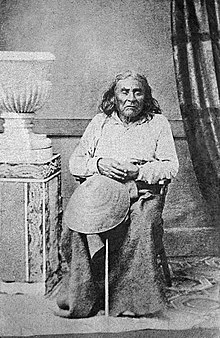Chief Si'ahl
| Seattle | |
|---|---|
| Si'ahl | |

The only known photograph of Chief Seattle, taken 1864
|
|
| Suquamish & Duwamish leader | |
| Personal details | |
| Born | c. 1786 On or near Blake Island, Washington, US |
| Died | June 7, 1866 (age 79–80) Port Madison, Washington, U.S. |
| Resting place | Port Madison, Washington, U.S. |
| Children | 8, including Princess Angeline |
| Known for | Namesake of city of Seattle |
| Religion | Roman Catholic |
Chief Seattle (c. 1786 – June 7, 1866) was a Suquamish Tribe (Suquamish) and Dkhw'Duw'Absh (Duwamish) chief. A prominent figure among his people, he pursued a path of accommodation to white settlers, forming a personal relationship with "Doc" Maynard. The city of Seattle, in the U.S. state of Washington, was named after him. A widely publicized speech arguing in favor of ecological responsibility and respect of Native Americans' land rights had been attributed to him. However, what he actually said has been lost through translation and rewriting.
The name Seattle is an anglicization of the modern Duwamish conventional spelling Si'ahl, equivalent to the modern Lushootseed spelling siʔaɫ IPA: [ˈsiʔaːɬ]. He is also known as Sealth, Seathle, Seathl, or See-ahth.
Seattle's mother Sholeetsa was Dkhw'Duw'Absh (Duwamish) and his father Shweabe was chief of the Dkhw'Suqw'Absh (the Suquamish tribe). Seattle was born around 1780 on or near Blake Island, Washington. One source cites his mother's name as Wood-sho-lit-sa. The Duwamish tradition is that Seattle was born at his mother's village of Stukw on the Black River, in what is now the city of Kent, Washington, and that Seattle grew up speaking both the Duwamish and Suquamish dialects of Lushootseed. Because Native descent among the Salish peoples was not solely patrilineal, Seattle inherited his position as chief of the Duwamish Tribe from his maternal uncle.
Seattle earned his reputation at a young age as a leader and a warrior, ambushing and defeating groups of tribal enemy raiders coming up the Green River from the Cascade foothills, and attacking the Chimakum and the S'Klallam tribes living on the Olympic Peninsula. Like many of his contemporaries, he owned slaves captured during his raids. He was tall and broad for a Puget Sound native, standing nearly six feet tall; Hudson's Bay Company traders gave him the nickname Le Gros (The Big Guy). He was also known as an orator; and when he addressed an audience, his voice is said to have carried from his camp to the Stevens Hotel at First and Marion, a distance of 3⁄4 mile (1.2 km).
...
Wikipedia
